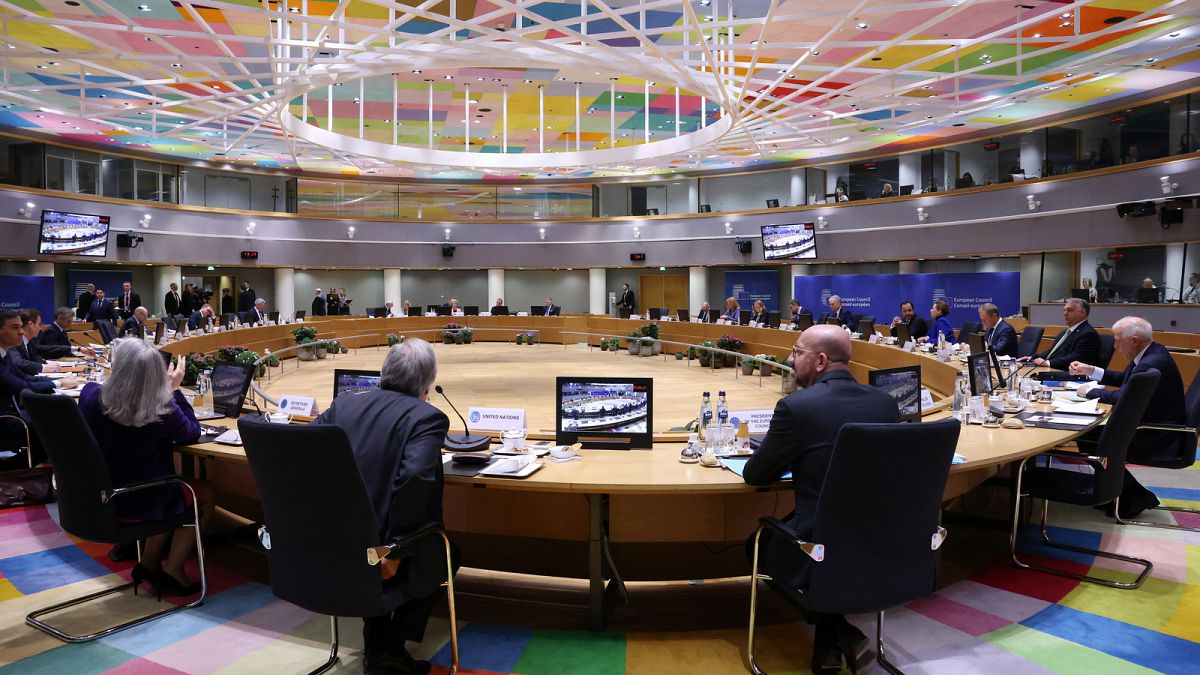In breakthrough, EU leaders call for eventual Gaza ceasefire for the first time
EU leaders have unanimously called for “an immediate humanitarian pause leading to a sustainable ceasefire” in Gaza, after Hungary subscribed to the statement for the first time since the outbreak of the Israel-Hamas war. The breakthrough on Thursday follows five months of deep divisions between the 27 leaders, whose failure to coalesce around a call […]


EU leaders have unanimously called for “an immediate humanitarian pause leading to a sustainable ceasefire” in Gaza, after Hungary subscribed to the statement for the first time since the outbreak of the Israel-Hamas war.
The breakthrough on Thursday follows five months of deep divisions between the 27 leaders, whose failure to coalesce around a call for a ceasefire has put EU unity under stress.
The conclusions – the result of intensive talks on Thursday evening as EU advisors hammered out a statement palatable to all 27 leaders – deplore the “catastrophic humanitarian situation in Gaza and its disproportionate effect on civilians” as well the “famine caused by the insufficient entry of aid into Gaza.”
European Council President Charles Michel, responsible for brokering the compromise between leaders, commended the “strong and unified statement.”
Leaders urge Israel not to proceed with its planned invasion of the southern Gazan town of Rafah, where over a million Palestinians are estimated to be sheltering from war. They also demand that Israel abide by the International Court of Justice’s landmark order in January, which obliges Netanyahu’s government to take measures to prevent genocide in Gaza.
While member states such as Belgium, Ireland, and Spain have called for a ceasefire as far back as late October, the Czech Republic and Hungary had previously blocked such a call for fear it would undermine the bloc’s support for Israeli’s right to self-defence.
All EU foreign ministers – bar Hungary’s – endorsed a call for an eventual ceasefire in the besieged Gaza strip in February, but Budapest wielded its veto power.
The EU is moving in lockstep with its trans-Atlantic ally. Antony Blinken, the US secretary of state, announced on Wednesday he would push for “an immediate ceasefire tied to the release of hostages” in a resolution to be tabled at the UN Security Council.
It is seen as a stark warning to Israeli Prime Minister Benjamin Netanyahu and a considerable shift in the position of the US, which has voted down UN resolutions on a ceasefire three times.
‘Deeply concerned’
In the harshly-worded statement, leaders say they are “appalled” and “deeply concerned” by the humanitarian situation in Gaza, and say “additional land crossings” are needed to deliver life-saving aid.
A new maritime corridor linking Cyprus with Gaza, called Amalthea, has received the EU’s backing, with Cypriot President Nikos Christodoulides telling reporters a second aid ship for Gaza will likely leave from the island this week.
But many leaders have said a maritime corridor cannot replace access by land, and urged Israeli authorities to do more to ensure aid reaches Palestinians.
In recent weeks, pockets of famine have appeared in Gaza. Major international organisations, including the UN’s World Food Programme, have been forced to temporarily suspend deliveries of food to the north of Gaza due to the chaos wrought as hungry Palestinians try to access aid convoys.
The WFP’s Famine Review Committee has warned that over 500,000, almost one in four of the population, could fall into famine by May.














